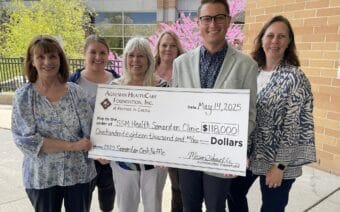
April 21, 2023
NEENAH – ThedaCare health system based in Neenah, and Froedtert Health based in Milwaukee, signed a letter of intent earlier this month to join the two organizations – the first step toward a merger.
“For some time, the Wisconsin-based leaders of both Froedtert Health and ThedaCare have been asking ourselves a question about how we can make a positive and long-lasting impact on healthcare and healthcare delivery for the people who live right here in Wisconsin,” Cathy Jacobson, Froedtert Health president and CEO, said.
Imran Andrabi, ThedaCare president and CEO, said the intent behind a merger is to make a “greater impact together.”
“I think the thing to focus on is why are we coming together?” he said. “These are two strong healthcare organizations from Wisconsin, led by people who live and work in Wisconsin, governed by people who live and work in Wisconsin for the people of Wisconsin.”
Definitive agreement
The letter of intent comes just seven months after ThedaCare health system’s announcement (September 2022) that it would begin partnering with the Froedtert & Medical College of Wisconsin health network in 2023 to enhance access to advanced-level care for ThedaCare patients.
Jacobson said what changed since then – when a merger was not part of the conversation – “we got to know each other even better.”
“(As) organizations, we knew how great each other was from the outside – clinical excellence, commitment to community, value-based organizations, reputation for innovation,” she said. “As we got to work together on our quaternary agreement with our partners at the Medical College, and then our joint venture, we found out how easy it was to come together and create those partnerships, because of how aligned we were.”
Jacobson said conversations about a potential merger became a “natural next step.”
//tbnapp.cdn.bubble.io/f1682102717464x142082528416982880/richtext_content.webpCathy Jacobson
“It was a continuation of a conversation where things were easy to work together and let’s do more of what we could do,” she said.
Over the next several months, Jacobson said the two health systems will work toward refining the details of a definitive agreement – with a goal of a completed merger by the end of 2023.
“Both of our organizations have deep, long-standing ties in the communities we serve,” she said. “By coming together with the state’s leader in regional community health, our combined organization will be poised to meaningfully address health equity and disparities, enhance access to a broader array of services and make it easier for patients to navigate the healthcare system. The Medical College of Wisconsin will continue to be an important partner in our work together.”
Andrabi said both systems have a commitment to the people of Wisconsin.
“We are alike in many ways…,” he said. “We have a shared vision for what we can do together to improve the health and well-being of the communities and be proactive partners in health. We are eager to start exploring how we can build a healthier, brighter future for Wisconsin.”
Jacobson said no decision has been made yet on where the headquarters for the proposed combined health system will be.
“I can tell you for sure it’s in Wisconsin – and that’s the most important thing,” she said. “This is a Wisconsin-based, Wisconsin-led organization going forward, and we’ll figure out the details about corporate headquarters later, but most of all is going to be right here in Wisconsin.”
No decision has been made on whether there will be a name change either.
“There hasn’t been a lot of conversation about that subject,” Jim Kotek, president of the ThedaCare board of trustees, said. “But what conversation has occurred, has been focused on the proud reputations and legacies of both organizations.”
//tbnapp.cdn.bubble.io/f1682102809203x343764669773938500/richtext_content.webpThe Froedtert & the Medical College of Wisconsin Academic Medical Center is located on the Milwaukee Regional Medical Center in Wauwatosa, with the Medical College of Wisconsin main campus (back, right), Children’s Wisconsin (back, middle) and Versiti Blood Research Institute (not pictured). Photo Courtesy of Froedtert Health
Kotek said it was quickly realized that the names Froedtert Health and ThedaCare are trusted names in Wisconsin communities.
“And with that said, we need to figure out ways for those names to continue going forward,” he said. “And there are many ways that can occur, but we haven’t engaged and specifically sorted through that, although those trusted names need to go forward.”
‘We found the right partner’
Jacobson said neither Froedtert nor ThedaCare had to merge, but are choosing to merge.
“What we want to do is create value,” she said. “We didn’t do this because neither one of us needs another partner. We did this because we found the right partner.”
Jacobson said Froedtert and ThedaCare have “developed a deep mutual respect for each other during the last 18 months.”
In those conversations, Andrabi said it gave everyone the opportunity to decide “are these the people you’re going to be able to work with in the long run and create that lasting impact?”
“I would say, we found the right match,” he said.
John Raymond, president and CEO of the Medical College of Wisconsin, said the merger is “an incredible event.”
“This is good news for Wisconsin,” he said.
Raymond said as Wisconsin’s largest private research facility, the Medical College of Wisconsin is “highly encouraged by this partnership” and “is committed to being strong allies” with the proposed combined health system.
Kotek said Wisconsin roots “run deep” for both Froedtert and ThedaCare.
“We feel a deep sense of responsibility to come together to build a better future for the communities in which we work and live…,” he said. “What we quickly realized is that it’s real and it is truly shared values and shared missions, and with that, the possibilities are limitless.”
Jacobson said the two health systems will be complementary to each other, because Froedtert primarily serves an urban population, while ThedaCare is known as a regional provider, reaching out into rural Wisconsin.
“The beauty I think of our partnership is we are not overlapping today,” she said. “So, this is an opportunity for us to continue to expand and treat more people in the State of Wisconsin. I think that’s beautiful because that helps us be able to share what both of us are great at and take it to more people across the state.”
//tbnapp.cdn.bubble.io/f1682102843404x261089123297406400/richtext_content.webpImran Andrabi
Andrabi said ThedaCare’s “long legacy” is taking care of rural, suburban and urban communities that are much different than the communities in Milwaukee and in surrounding areas.
He said Froedtert will be able to “bring a lot of that value back” to those rural communities – such as ThedaCare’s Rural Health initiative, a community health program focused on the health and safety of those who work in agriculture.
“Connecting that all the way up to quaternary care and complex care and academic care and research – I see this as a beautiful, and I use that word intentionally, way of thinking about what the problem sets are, and then how we solve them as we go forward,” he said. “These are two strong organizations with demonstrated excellence… We are complementary to what we bring to the table.”
A ‘tremendous opportunity’
Raymond said the Medical College of Wisconsin already has two campuses outside of Milwaukee – located in Green Bay and Wausau, but this partnership will allow “us to address the workforce maldistribution in the northern part of the state.”
“And that’s been something we have desired to do for a long time,” he said.
With the Medical College of Wisconsin as part of the Froedtert Health Network, Andrabi said it’s a “tremendous opportunity” to train the next generation of healthcare providers.
“That’s the beauty of being part of an academic medical center – when people come to medical school in Wisconsin and stay in a residency in Wisconsin, the chances of you staying in the State of Wisconsin and taking care of people is more than 70%,” he said. “And that’s the continuity. We talk about clinical continuity, but there’s academic continuity that brings a tremendous amount of value to the state and to the people of Wisconsin.”
Jacobson said Froedtert and ThedaCare have as their goal to become Wisconsin’s leader in healthcare.
“Again, we both have national reputations for clinical quality for innovation, but we think by coming together, we can attract even more,” she said. “The Medical College of Wisconsin already does a phenomenal job of attracting clinical talent. We want to hopefully enhance that even more… And we think we can do that by creating this place to learn together.”
Next steps
Following the launch of the new health system, Jacobson said she will initially assume the role of CEO and Andrabi will serve as president.
After a six-month transition period, she said she will retire from the organization, and Andrabi – who has more than 30 years of medical, operational and strategic experience – will assume the role of president and CEO.
Jacobson said the combined health system will be governed by a parent board composed of 18 members.
The initial board chair will be Jud Snyder, Froedtert Health’s current vice chair and chair-elect, with Kotek serving as the initial vice chair.
Upon approval of the proposed merger, plans are in place to elevate several key leaders of both organizations to serve as executive officers of the combined organization, including:
Thomas Arquilla (current chief strategy officer of ThedaCare) – will serve as chief growth officer.Scott Hawig (current executive vice president of finance, chief financial and administrative officer and treasurer of Froedtert Health) – will serve as chief financial officer. David Olson (current chief business development officer of Froedtert Health) – will serve as chief business development officer. Ian Schwartz (current executive vice president and chief clinical officer of Froedtert Health) – will serve as chief clinical officer. Mark Thompson (current chief operating officer and chief financial officer of ThedaCare) – will serve as chief transformation investment officer.
The full executive leadership team, as well as regional leadership structures, will be identified before the execution of the definitive agreement.
If approved, this would become the second major Northeast Wisconsin health system merger in about a year – with Bellin Health of Green Bay and Gundersen Health of La Crosse being the first, completing a merger at the end of last year.
About Froedtert and ThedaCare
Froedtert Health is a primarily urban-integrated healthcare system providing a variety of health-related services, at six hospitals and four community hospitals, health centers, home care, laboratory, health insurance, employer health services and workplace clinics and digital health solutions.
ThedaCare serves communities in Northeast and Central Wisconsin, delivering care to more than 650,000 residents in 17 counties.
ThedaCare has 180 points of care, including eight hospitals.
To stay up to date on the merger, head to WIcareWIroots.com.
Editor Heather Graves contributed to this story.
 Fifth Ward Brewing Co. raises a glass to growing business
Fifth Ward Brewing Co. raises a glass to growing business It’s official: Rice Lake ‘is on the map’
It’s official: Rice Lake ‘is on the map’








